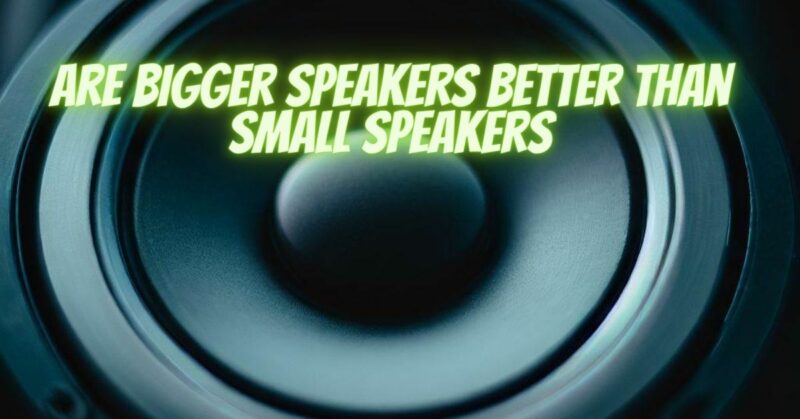Choosing the perfect speakers for your audio setup can be a daunting task, especially when faced with the question: “Are bigger speakers better than small speakers?” In this article, we will explore the factors that determine speaker performance and help you understand the nuances of choosing between larger and smaller speakers to meet your audio needs.
The Role of Speaker Size
Before we delve into the comparison, it’s essential to understand that speaker size is just one aspect of speaker design. Speakers come in various sizes, and each size has its advantages and limitations:
- Speaker Size: This typically refers to the diameter of the driver within the speaker, responsible for producing sound. Common sizes include 5-inch, 6.5-inch, 8-inch, 10-inch, 12-inch, and larger.
Advantages of Bigger Speakers
Larger speakers offer certain advantages that can enhance the audio experience:
- Enhanced Bass Response: Bigger speakers can move more air, allowing them to reproduce lower frequencies more effectively. This results in deeper and more resonant bass.
- Greater Power Handling: Larger speakers can generally handle more power, which can lead to higher volume levels without distortion.
- Room-Filling Sound: In larger rooms or open spaces, bigger speakers can project sound more effectively, ensuring everyone can enjoy the audio experience.
- Presence and Impact: For applications like home theaters or live performances, larger speakers can provide a sense of presence and impact that smaller speakers may struggle to achieve.
Advantages of Smaller Speakers
Smaller speakers also have their unique strengths that make them a preferred choice in various scenarios:
- Compact and Versatile: Smaller speakers are more portable and space-efficient, making them ideal for setups where space is limited or for portable audio solutions.
- Precision and Clarity: Smaller speakers often have faster transient response and can reproduce mid and high frequencies with precision and clarity.
- Aesthetic Appeal: Compact speakers can blend seamlessly with modern interiors and minimalist design aesthetics.
- Cost-Effective: Smaller speakers tend to be more budget-friendly, offering excellent sound quality at a lower price point.
Factors to Consider When Choosing Speakers
When deciding between bigger and smaller speakers, consider the following factors:
- Room Size: The dimensions of your listening environment significantly influence the choice. Smaller rooms may benefit from smaller speakers, while larger spaces may require the power of bigger speakers.
- Listening Preferences: Your musical tastes and content consumption habits play a significant role. Smaller speakers may be suitable for genres that prioritize clarity, while larger speakers are often preferred for bass-heavy music.
- Budget: Consider your budget, as larger speakers can be more expensive than their smaller counterparts.
- Room Acoustics: The acoustic characteristics of your room can impact sound quality. Proper room treatment can improve the performance of both small and large speakers.
- Setup Flexibility: Think about whether you need a portable or flexible setup. Smaller speakers are more versatile in this regard.
The choice between bigger and smaller speakers ultimately depends on your specific audio needs, room size, budget, and listening preferences. There is no one-size-fits-all answer to whether bigger speakers are better than small speakers. Instead, focus on finding speakers that align with your unique requirements and deliver the sound quality and listening experience you desire. Whether you choose larger or smaller speakers, the goal is to create an audio setup that brings your music, movies, and games to life with the best possible sound quality.


